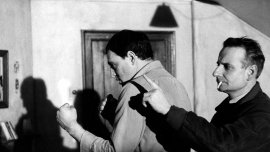

By Neil Sinyard
Midway through David Storey’s novel This Sporting Life, published in 1960, the widow Mrs. Hammond tells the hero that the woman commitment with him is making the woman experience “dirty.” “I couldn’t believe why she should state all this work, ” he muses, “and the quickest way of stopping it I found would be to hit the lady.”
Lindsay Anderson’s movie of this book replicates that moment and typifies its tone and motif. This Sporting Life (1963) is a clenched fist of a movie. Its hero, Frank Machin (Richard Harris), is an expert Rugby League player whom instinctively channels experiencing through real hostility. Early in the movie, when he continues to be being employed as a coal miner, he provokes a fight in a dance hall just, it seems, regarding jealousy. In the trial online game for club, he deliberately injures a person on his own side when he feels that teammate has effects on his performance. His very first love scene with Mrs. Hammond (Rachel Roberts) is much more like rape than romance, presaging a relationship that develops into a tormented battle, she nonetheless in mourning throughout the death of the woman spouse, he brutally—and in the end, fatally—trying to pull her out of the woman layer of coldness and withdrawal.
Most sporting movies include discomfort, nevertheless they will result in victory because of their hero, typically as incentive for his ethical redemption. By comparison, This Sporting Life starts within the realm of pain—Frank is thumped-in the face during a match ahead of the narrative right has also begun—and never ever leaves it. The rugby field is a battleground of brutality, physical fitness, and success. Some moments between Machin and Mrs. Hammond tend to be more like brawls than arguments, causing you to flinch (the distinguished cameraman Walter Lassally thought they'd an emotional energy unequaled in any Uk movie). An outspoken critic in the younger times of the timidity of Uk cinema, manager Lindsay Anderson had been taking his bold ideas onto the display.
Born in Asia in 1923, the son of a Scottish major-general, and informed at Cheltenham public school and Wadham College, Oxford, Anderson had first-made a name for himself whilst the creator of this film mag Sequence in 1947. With its pages he championed the poetic cinema of Jean Vigo, Humphrey Jennings, and John Ford, directors whose films had just what he labeled as “larger implications as compared to surface realities might recommend, ” and extolled the vital precepts of dedication, nerve, and conviction that have been become the watchwords of his very own cinematic practice. That rehearse began immediately after that, with a number of brief fiction and documentary works in belated 40s and very early fifties. After winning an Oscar for Thursday’s kids (1954), a sensitive documentary about a school for deaf-and-dumb kiddies, codirected with man Brenton, he became the driving force behind the alleged totally free Cinema movement regarding the mid-1950s, in which “free” was a synonym for “personal.” It featured six programs of films by brand new administrators at London’s nationwide Film Theatre, including Anderson’s very own O Dreamland (1953) and Every Day Except Christmas (1957), which aimed to bring a new working-class realism to the display screen. These movies coincided with an identical trend toward social realism and rebellion resistant to the built-in conservatism of British tradition and society into the plays of John Osborne, Arnold Wesker, Harold Pinter, yet others, plus in the modern working-class books of John Braine (area at the very top), Alan Sillitoe (Saturday Night and Sunday Morning), Stan Barstow (A Kind of Loving), and David Storey, whoever unusual sexual and personal frankness were very recommended and extremely popular. The screen adaptations of those novels within the belated fifties and very early sixties ushered in a brand new period of Uk movie and formed the core of what was becoming referred to as Uk new revolution, a movement which the later This Sporting Life had been probably the most powerful appearance.
Anderson had check this out Sporting Life with great admiration. He knew its north of The united kingdomt milieu, as he had made several documentaries when it comes to mining engineering business Sutcliffe Ltd. in Wakefield when you look at the late 1940s and very early 1950s, as well as a documentary, Wakefield Express (1952), in regards to the functions of the regional newspaper. (This Sporting Life ended up being shot on location when you look at the city and uses a number of the people through the Wakefield Trinity team to include authenticity to the rugby scenes.) Exactly what truly impressed Anderson had been the grade of the writing. “He seeks to enter the soul, ” he said of Storey, “yet he never forgets the relevance associated with personal globe where souls satisfy, conflict, and battle. He labors to stabilize the ambiguities of your nature: male and feminine, pain and physical violence, isolation and love.” In talking about Storey such terms, Anderson has also been disclosing anything of himself.
Storey was a separated person, a coal miner’s child and a professional rugby player which, ahead of the publication regarding the novel, had in addition funded their way through art college. If ambiguities of Machin’s personality plainly echoed those for the writer, they hit a strong chord in Anderson also, a closeted homosexual privately infatuated with his leading star, Richard Harris, and, possibly due to this, empathizing with all the repressed Mrs. Hammond, who's alternatively awed and appalled by Machin’s oppressive maleness. “A bleak northern event of effective, inarticulate feelings frustrated or deformed by puritanism and inhibition” ended up being the way Anderson described the central commitment, incorporating ruefully, “No room right here for appeal or emotional proletarianism.” Real enough: whenever term “I love you” eventually escapes Machin’s mouth, Mrs. Hammond spits inside the face. It really is perhaps one of the most harrowing interactions in Brit movie, however it sears the heart because both Harris and Roberts give the performances of their life. They certainly were both to be selected for Oscars, and Harris would be to secure the most effective star award at the Cannes event, while Roberts was to win a British Academy award as best celebrity.
christmas tree drawing society awards corona cases worldwide worldwide vaccination table stylish rucksack what is the best coworking space for animators fashion communication portfolio stylish jumpsuits outdoor bars manchester outdoor pool london how do you make a business facebook page how to start a burger van business canary wharf coworking space coworking space southwark what kind of jobs can you get with a business management degree? outdoor water parks near me what is a vendor in business coworking office space designINTERESTING VIDEO












